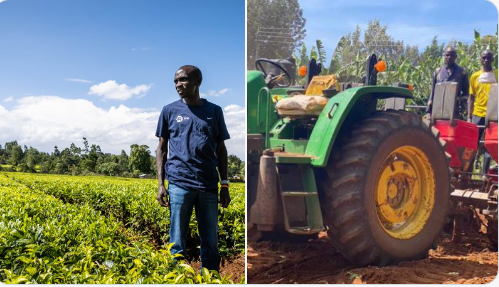Eliud Kipchoge is widely known as a legendary marathon runner, having broken the world record and being the only man to run a marathon distance of 42km in under two hours.
However, what many people may not know is that he is also a successful farmer, with ventures in dairy and tea farming.
In an exclusive interview with Smart Harvest, Kipchoge shared his experience in farming and the lessons he has learned along the way.
Inside Michael Olunga’s multimillion home in Homa Bay and properties he owns
Kipchoge ventured into farming in 2013, choosing to keep dairy cows in Uasin Gishu County and grow tea in Nandi County. Coming from a community that values the rearing of cows and growing of tea, these two ventures made sense to him.
However, Kipchoge acknowledges that farming is a journey that requires careful preparation and planning.
”Just like running a marathon, it requires passion, patience, dedication, hard work and commitment. For instance, in dairy farming, the journey does not just begin when you buy your cows. It is a painstaking walk that requires patience and commitment despite the negative outcomes,” he says.
One of the most critical aspects of dairy farming, according to Kipchoge, is the way you treat the cows.
“Cows are very delicate creatures, and the way you treat them determines the output,” he advises.
He emphasizes that cows must be fed well and kept in a clean environment. Kipchoge’s wife, Grace, plays a significant role in running the farm, serving as the general manager.
She ensures that the diary unit is cleaned twice a day, morning and evening, to keep flies and pungent smells away. She also makes sure that the farmhands milk the cows correctly, as improper and incomplete milking can lead to bacterial infections like mastitis.
The milker must ensure their hands are clean and dry, and they use a clean cloth to wipe the teats.
Feeding is another crucial component in a dairy enterprise to boost milk yields.
Kipchoge’s farm feeds the cows silage and nappier grass, which have helped maintain high milk yields. As commercial feeds can be expensive, Kipchoge advises upcoming dairy farmers to grow their hay and store it for later use.
Climate change can cause unpredictable rains, so storing silage for dry seasons is essential. For feeds storage and management, one can start small and advance as they move forward.
Kipchoge acknowledges that farming has its highs and lows, with some seasons providing a bumper harvest and high milk yields, while other times the prices are disappointingly low.
He advises farmers to keep walking, never giving up on their farming journey. Every day is a learning opportunity, and each lesson picked along the way informs more informed decisions in the future.
Like any business venture, Kipchoge has made mistakes in farming, such as buying hybrid cows without prior knowledge, leading to poor milk output.
He advises upcoming dairy farmers to do solid due diligence before investing their cash in dairy. Some animals may look promising from the outside, but upon digging out their history, they may have issues and are poor performers.
Kipchoge notes that the average age of a Kenyan farmer is 58, and most young people shun farming because they view it as a dirty and uncool venture. He disagrees with this notion, stating that farming can be a profitable and exciting venture with passion.
To encourage more young people to take up farming, Kipchoge believes the state should allocate more incentives to make it attractive. Technology, which young people love, is an excellent catch for them.
Kipchoge is yet to adopt any sophisticated technology on his farm, but he has plans to modernize operations and processes. He notes that technology can boost productivity, cut down on labor costs, and improve efficiency. For example, using sensors to monitor soil moisture and temperature can help farmers make informed decisions.









